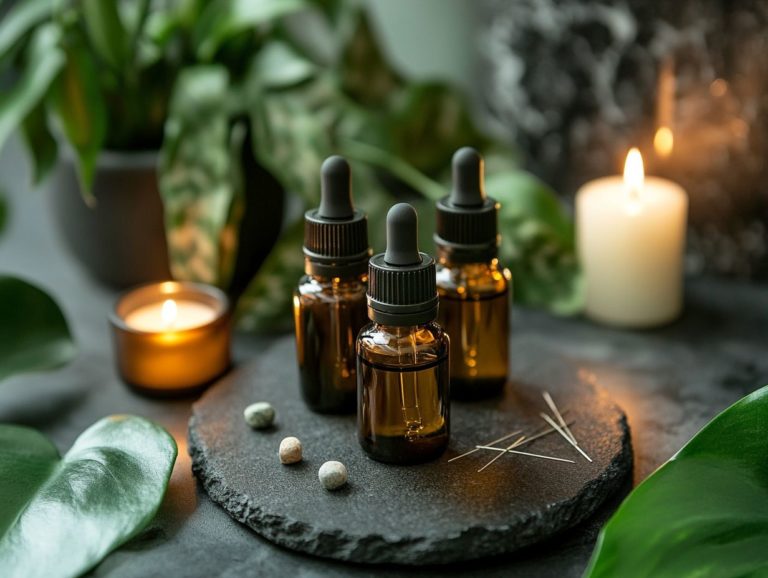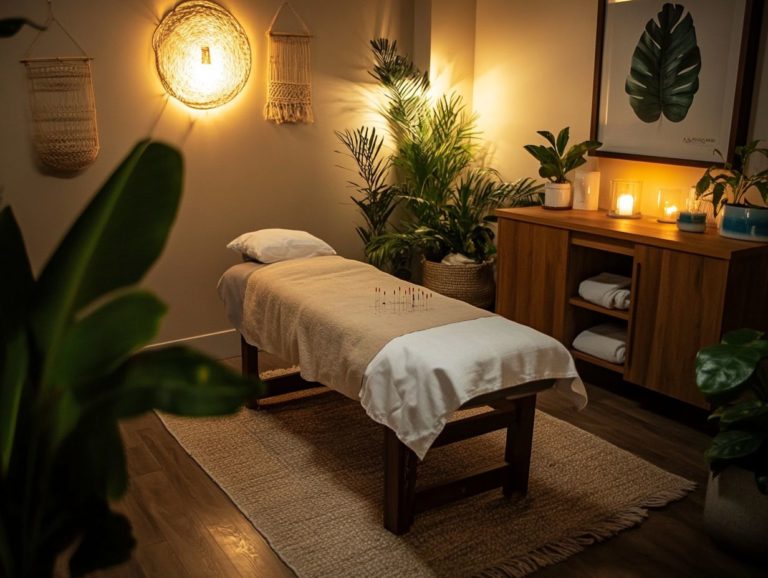The Role of Acupuncture in Managing Depression
Depression is a complex mental health disorder. It affects millions of people worldwide.
While traditional treatments like medication and therapy are crucial, many individuals are seeking complementary approaches, including acupuncture.
This article delves into the role of acupuncture in managing depression, exploring how it works, its benefits, and the latest research findings.
You ll also find guidance on incorporating acupuncture into your treatment plan and tips for selecting the right acupuncturist to meet your unique needs.
Discover how this ancient practice could transform your healing journey!
Contents
- Key Takeaways:
- Understanding Depression
- Current Treatment Options for Depression
- The Role of Acupuncture in Managing Depression
- Research on Acupuncture for Depression
- Incorporating Acupuncture into Treatment Plans
- Choosing an Acupuncturist for Depression
- Frequently Asked Questions
- What is the role of acupuncture in managing depression?
- How does acupuncture help with depression?
- Is acupuncture a safe treatment for managing depression?
- Can acupuncture be used as a standalone treatment for depression?
- How many acupuncture sessions are needed to see results in managing depression?
- Are there any side effects of acupuncture for managing depression?
Key Takeaways:

Acupuncture can be a beneficial treatment option for managing depression by targeting specific points on the body to promote relaxation and balance. Research has shown that acupuncture can improve mood, reduce anxiety, and increase energy levels. Incorporating acupuncture into a comprehensive treatment plan can complement other therapies and medications, providing a holistic approach to managing depression.
Understanding Depression
Understanding depression requires recognizing it as a multifaceted mental health disorder. It brings forth debilitating symptoms like profound sadness, overwhelming fatigue, and significant changes in appetite.
This condition can stem from various factors, including genetic predisposition, stress, and environmental influences. Healthcare providers stress the importance of early intervention and treatment to enhance outcomes for those affected.
It s crucial to note that depression often coexists with other health issues, especially anxiety and chronic pain, which can amplify its effects and challenge individuals overall mental well-being.
Symptoms and Causes
Depression can present itself through various symptoms, including persistent sadness and fatigue. These symptoms can profoundly affect daily life and overall functioning.
Emotional signals often intertwine with physical manifestations, such as changes in appetite and sleep disturbances, leading to a deep sense of hopelessness.
Cognitive symptoms can complicate matters; impaired decision-making and memory challenges may hinder both professional and personal relationships.
When exploring the roots of depression, multiple factors come into play, including genetic predispositions that might make certain individuals more susceptible. Environmental stressors like prolonged exposure to trauma or societal pressures can further aggravate the condition.
Co-occurring health issues, especially anxiety, can intensify the experience, creating a complex challenge that necessitates a nuanced understanding and robust support system.
Current Treatment Options for Depression
Current treatment options for depression are varied and designed to meet your unique needs and preferences. They blend both medication and non-medication approaches.
Healthcare providers often prescribe medications like fluoxetine to help alleviate symptoms. Therapeutic techniques such as cognitive behavioral therapy (CBT) effectively tackle underlying mental health issues.
Combining these treatment methods can significantly enhance your outcomes and support your journey toward recovery.
Medications and Therapy
Medications, especially antidepressants, are pivotal in managing depression. They help regulate neurotransmitters and elevate your mood.
To navigate your treatment effectively, it s essential to understand the various categories of antidepressants:
- Selective serotonin reuptake inhibitors (SSRIs)
- Serotonin-norepinephrine reuptake inhibitors (SNRIs)
- Atypical antidepressants
Each type has a unique mechanism for balancing chemical levels in the brain, significantly alleviating emotional distress. However, it’s crucial to remain mindful of potential side effects, which can range from mild discomfort to more serious health issues.
In addition to medication, incorporating therapeutic approaches like talk therapy can offer substantial benefits. This creates a safe space to explore your feelings and develop valuable coping strategies, ultimately enhancing your overall well-being.
Take the first step towards better mental health explore acupuncture today!
The Role of Acupuncture in Managing Depression

Acupuncture is gaining recognition as a treatment for depression within traditional Chinese medicine. It focuses on restoring energy flow and achieving balance in the body.
Practitioners stimulate specific points along energy pathways to alleviate depression symptoms and enhance mental well-being. Research shows acupuncture can effectively complement conventional treatments, such as antidepressants, offering a holistic approach to mental health.
How Acupuncture Works
Acupuncture stimulates points on your body to balance your energy flow, known as qi. This ancient practice depends on interactions within your body’s energy pathways, connecting various organs.
Licensed acupuncturists target these points to influence mood chemicals, promoting the release of endorphins that ease pain and induce relaxation.
Practitioners assess your unique condition to tailor treatments, restoring harmony and optimizing health. Energy pathways carry both energy and information, highlighting the connection between your physical and emotional well-being.
Benefits of Acupuncture for Depression
Acupuncture offers many benefits for those facing depression, such as improved mood and reduced anxiety. Research indicates this practice not only alleviates depressive symptoms but also provides effective pain relief.
It may help regulate hormones, stabilizing mood swings and fostering emotional well-being. In a case study, consistent acupuncture treatment significantly decreased symptoms in patients with severe depression, leading to better outcomes.
These real experiences show how acupuncture can enhance both mental and physical health holistically.
Research on Acupuncture for Depression
Research has revealed promising results about acupuncture’s effectiveness as a complementary treatment for depression. Embracing this approach can support your journey towards emotional well-being.
Key Findings and Studies
Numerous studies show that acupuncture can significantly alleviate depression symptoms and improve your quality of life. A systematic review in the Journal of Clinical Psychiatry examined 29 trials with over 2,500 participants.
Participants receiving acupuncture reported a 50% reduction in symptoms, compared to those receiving placebo treatments. Many studies included control groups receiving sham acupuncture, ensuring the genuine benefits of acupuncture were highlighted.
A meta-analysis found acupuncture could be as effective as standard antidepressant medications, with 64% of participants experiencing significant improvement. These findings support the integration of acupuncture into mental health treatment plans.
Incorporating Acupuncture into Treatment Plans

Incorporating acupuncture into your treatment plan requires teamwork among healthcare providers. This collaboration ensures acupuncture complements other therapies, addressing various mental health disorders effectively.
How Acupuncture Can Complement Other Treatments
Acupuncture can be a valuable complementary treatment alongside conventional therapies for depression. It significantly enhances the effectiveness of mental health care.
This ancient practice helps individuals manage their symptoms while continuing their prescribed medications. Many have shared transformative experiences, noting reductions in anxiety and improved emotional balance after incorporating acupuncture into their therapy sessions or alongside their antidepressant medications.
By stimulating specific points on the body, acupuncture promotes relaxation and encourages energy flow, working harmoniously with medications. Those who embrace both methods often describe a newfound sense of control over their mental well-being. This integrative approach not only alleviates symptoms but also fosters a deeper connection to overall health.
Choosing an Acupuncturist for Depression
Selecting an acupuncturist to address depression is a crucial step in your healing journey. Ensuring you choose a licensed practitioner with the right qualifications can profoundly influence your outcomes.
Important Considerations and Tips
When selecting an acupuncturist for mental health issues, weigh their qualifications, treatment approach, and patient experiences. This fosters a positive therapeutic relationship.
Investing time in researching various practitioners can lead to better treatment outcomes and increased comfort. Begin by verifying their credentials; a licensed acupuncturist should possess the necessary certifications and training.
Ask insightful questions about their experience with mental health treatments and the techniques they use.
Be vigilant for red flags, such as a lack of professionalism or a dismissive attitude toward your concerns. Remember, establishing trust is paramount; a strong practitioner-patient dynamic can significantly enhance your healing journey.
Frequently Asked Questions
What is the role of acupuncture in managing depression?

Acupuncture is a traditional Chinese medicine practice involving the insertion of thin needles into specific points on the body. It is effective in managing depression by improving mood, reducing anxiety and stress, and promoting relaxation.
How does acupuncture help with depression?
Acupuncture helps with depression by stimulating the release of endorphins, natural pain-relieving chemicals in the body. It also regulates neurotransmitters, chemicals that transmit signals in the brain, such as serotonin and dopamine, which impact mood and emotions.
Is acupuncture a safe treatment for managing depression?
Yes, acupuncture is generally considered safe for depression. The needles are very thin and sterile, reducing the risk of infection. It s important to seek treatment from a licensed and experienced acupuncturist to ensure proper technique and safety.
Can acupuncture be used as a standalone treatment for depression?
No, acupuncture should not be used alone for depression. Use it with other treatments, such as therapy and medication, for the best results. It can complement these therapies, helping manage symptoms and improve overall well-being.
How many acupuncture sessions are needed to see results in managing depression?
The number of acupuncture sessions needed varies by individual. Some may see improvement after just a few sessions, while others may require more. Discuss treatment goals and expectations with your acupuncturist to determine the best course for you.
Are there any side effects of acupuncture for managing depression?
Acupuncture is generally well-tolerated, and side effects are rare. Some may experience mild bruising or soreness at the needle insertion site. In very rare cases, serious side effects such as nerve damage or infection may occur. Discuss any concerns with your acupuncturist before starting treatment.






